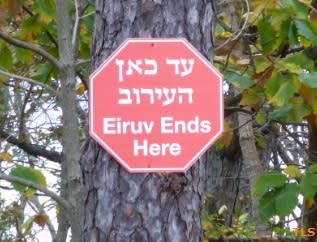Our parsha relates that the Jews in the desert were so enthusiastic to help provide for the Mishkan and its contents that Moshe soon had to announce that people should stop bringing their workmanship to the encampment of the Leviim, where the Mishkan was located. “And the call was broadcast in the camp, saying, no man or woman should do any more workmanship for the sanctified donations; then the people stopped bringing.” (Shemot 36:6.)
The gemara explains that this announcement was made on Shabbat, and part of its purpose was to warn people not to carry the objects for the Mishkan from their private domains to the central encampment via the public thoroughfare. And it is from this verse that we learn that carrying from one domain to another on Shabbat is a forbidden melacha. (Shabbat 96b.)
In the time of King Shlomo, this rule was extended to forbid carrying even between two distinct private domains. (Shabbat 14b.) Since the courtyard of several private dwellings has a public character, it could be confused with a true public domain. Seeing people carrying from the house to the courtyard, people would assume that it was permissible to carry into the street as well.
Such carrying is permissible only through eruv chatzerot, a “mingling of courtyards” in which several adjoining properties are symbolically combined into one via joint ownership of a Shabbat meal. (SA OC 366.)
This decree seems to bear a message of alienation: each household is viewed as its own private world, and each neighboring household is presented as a menacing foreign domain likened to a public thoroughfare.
However, the decree came with its own solution with the exact opposite message, one of fellowship. By the simple expedient of putting food for one meal in a central location and making each household a partner in the meal and the room, the entire courtyard or even an entire city is turned into a single domain! Recognizing the threat of alienation gives us the impetus to create brotherhood.
War Rabbis: Rav Hai Gaon Why was this decree instituted specifically in the time of King Shlomo? Rav Hai Gaon gives a profound answer to this question.
The mishna tells us that an army camp is exempt from the requirement to make an eruv. (End of first chapter of Eruvin.) Rav Hai Gaon observes that when Shlomo’s kingdom was established, “he had peace from all sides around”. (Melakhim I 5:5.) Until this time, the Jewish people considered themselves to be in an ongoing state of war – as if the entire nation were considered a single army camp. (Cited by Semag, beginning of Hilkhot Eruvin, and Bach OC 366.)
An army camp has its own kind of fellowship, but it is a kind much different than that of the city. In wartime, there is virtually no privacy, and no stability. A truly private domain barely exists. It is no wonder that there was then no need to create an “eruv”.
Finally, in the time of Shlomo, the Jewish people had a sense of security, and this gave them a sense of privacy. The verse just mentioned says that Shlomo had peace from all sides; the very next verse elaborates that “Yehuda and Yisrael sat securely, each man under his vine and under his fig tree, from Dan [in the far north] unto Beer Sheva [in the far south] all the days of Shlomo.”
When each person is conscious of his own privacy, his own property and his own place, then there is a certain degree of alienation, and a need for special steps to create community and fellowship. According to Rav Hai Gaon, this is the historical background to the institution of “eruv”.
But peace and prosperity not only create the need for fellowship, they also create the greatest opportunity for ideal fellowship. It is true that adversity gives people an urgent sense of community and common purpose, motivating them to give up their privacy and work together for the collective good. But ironically, this very lack of privacy can constitute a barrier to true community. In order to open up to others, we require a certain personal space, a modicum of privacy and modesty.
We could say that prior to the time of Shlomo, a true sense of “eruv”, of mingling of distinct domains, was not only unnecessary but was also impossible. It was only through the security of “each man under his vine and under his fig tree” that each person attained a willingness to truly welcome his neighbors into his private space.
Rabbi Asher Meir is the author of the book Meaning in Mitzvot, distributed by Feldheim. The book provides insights into the inner meaning of our daily practices, following the order of the 221 chapters of the Kitzur Shulchan Arukh.
The words of this author reflect his/her own opinions and do not necessarily represent the official position of the Orthodox Union.

